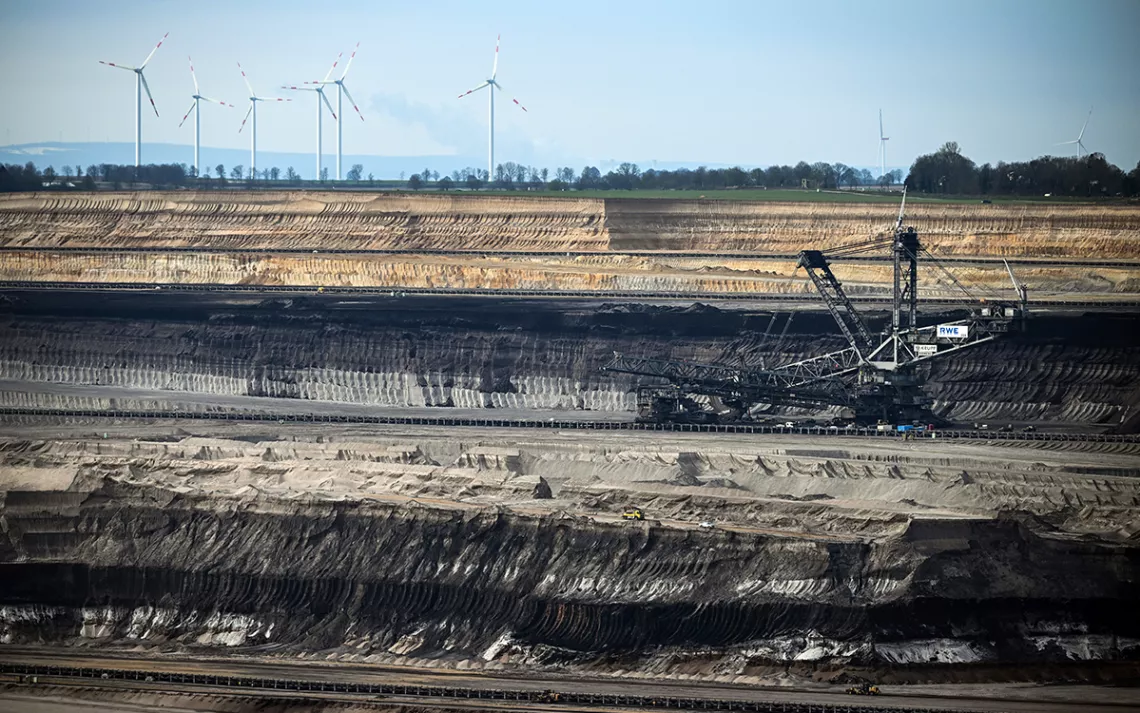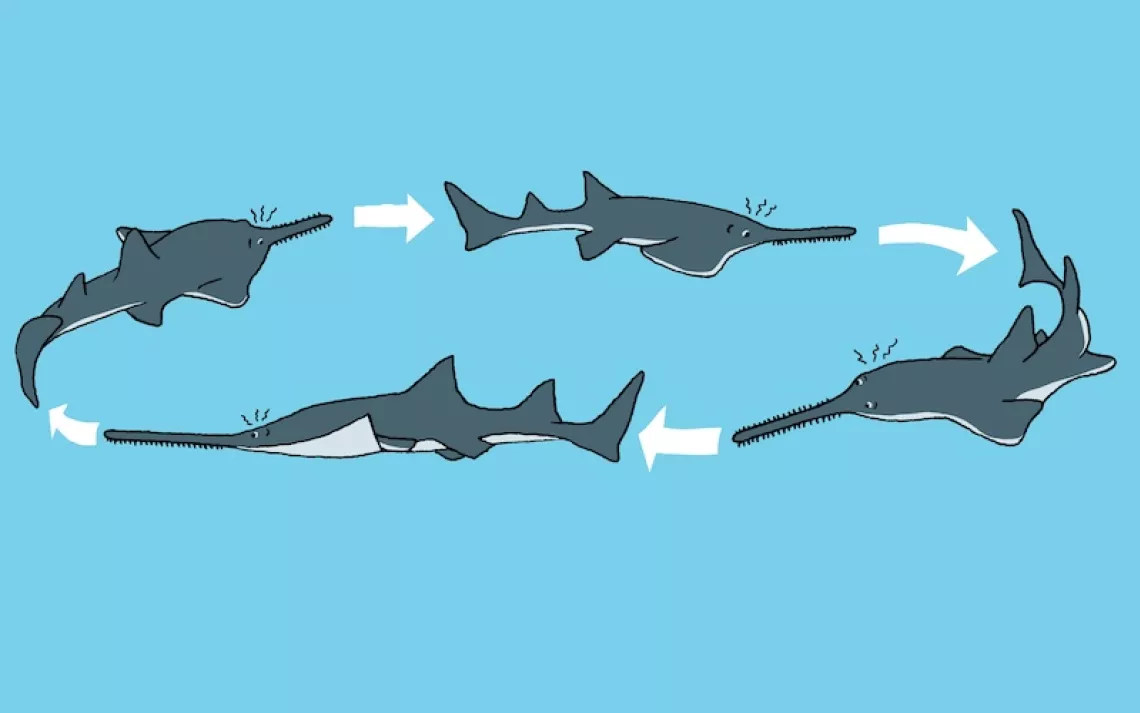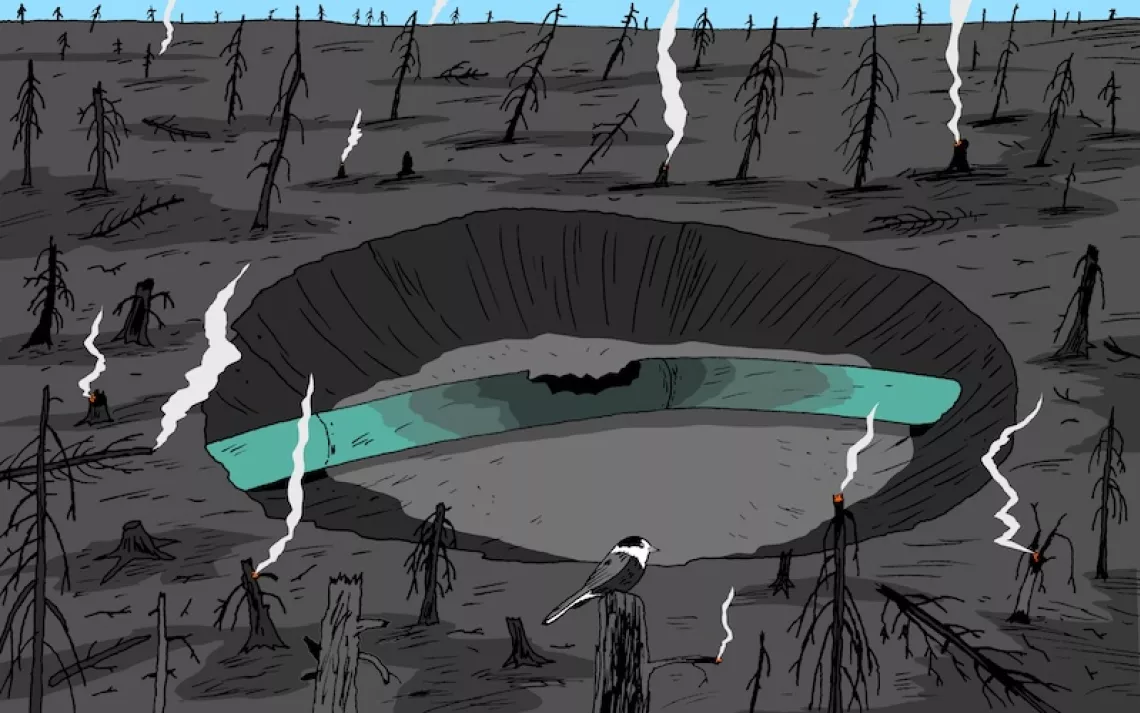The Global Climate Breakdown: In Conversation With Rachel Kyte
A foreign policy expert discusses climate trends to watch in 2023

Mining machines work in the Garzweiler open-pit lignite mine. | Photo by Federico Gambarini/picture-alliance/dpa/AP Images
Climate change occupies a peculiar space in the public’s imagination. Most Americans recognize that climate change is real and that it is causing real harms, both here and abroad. They are worried about it. Yet many Americans still often struggle to see how global warming directly affects them.
That’s not entirely surprising. Our newsfeeds are dominated by a blur of events laying claim to our attention. In contrast to, say, our Washington political dramas, or the catastrophe of Russia’s invasion of Ukraine, or the rising tensions with China, climate change can seem like a vague and distant concern.
But the truth is that all of these issues are bound up with climate change: either by making the climate challenge worse or by impeding the world’s ability to address it.
To see how the biggest trends in global affairs are related to the climate crisis, I spoke with Rachel Kyte, dean of the Fletcher School at Tufts University. Before her academic career, Kyte served as special representative of the UN secretary-general and chief executive officer of Sustainable Energy for All, and was the World Bank’s special envoy for climate change. Few people have a clearer understanding of how these disparate pieces all fit together. Our conversation has been edited for clarity and brevity.

Steve Herz: Let's start with the fallout from Russia’s invasion of Ukraine. It has obviously roiled global energy markets, causing prices to spike and constraining supply around the world. We've heard a lot about how that is being felt in Europe, but can you explain how it has impacted people in the developing world, particularly the poor?
Rachel Kyte: Europe pivoted away from Russian hydrocarbons and entered the global energy markets to replace, in particular, gas. And that spiked demand, which sent prices up. It also meant that Europe was buying up gas that would normally have been available for African and Asian countries.
Fuel price inflation came with food price inflation because of the importance of Ukraine, Belarus, and Russia to grain exports. Egypt, Yemen, some other North African countries are dependent upon grain imports from these countries, and that supply was disrupted. There was also significant disruption to fertilizer supply, since most of the inputs for fertilizer come from Russia and Belarus.
These all came together as a perfect storm of food and fuel price inflation. And it happened on the back of already disrupted supply chains and inflation due to the economic consequences of COVID, and to some extent, the knock-on effects of climate change.
So many developing countries were already experiencing increasing levels of debt in order to cope with how much prices have gone up and supply chain disruption. Many are losing percentage points of GDP every year because of climate impacts, and then this came on top of it.
This left a significant number of developing countries really in a desperately difficult situation, and now we have 60 to 80 countries potentially needing to come to the International Monetary Fund to help reschedule or write off their debt.
And the upshot of this from a sustainability point of view is that it's very difficult to engineer green growth, or to invest in a clean energy system, more resilient agriculture or adaptation to sea level rise if you're indebted. And so many countries that are incredibly vulnerable now find themselves without the basic fiscal tools to manage their economies through what is going to be a difficult transition.
OK, so there’s this perfect storm of inflation, increased debt, food and energy insecurity, and climate impacts that have all landed on developing countries. Last year, the prime minister of Barbados, Mia Mottley, proposed something called the Bridgetown Initiative, which is a set of reforms to the global financial system to help countries deal with these challenges, and it's gotten a ton of attention and support. Can you walk me through that proposal?
Mia Mottley was trying to point out the fundamental impracticality of the rules and the governance around how the Bretton Woods Institutions [the World Bank and International Monetary Fund] work. The rules were written in the middle of the 20th century, in a colonial era, by a bunch of white men at the top of a mountain in New Hampshire, right? And they obviously don't work for the countries that are forced to borrow. They are potentially risking the ability of the IMF to be there as the lender of last resort. I mean, if you have that many countries queuing up for debt relief, how is the IMF going to handle all of that?
So Bridgetown talks about rewriting the rules for a world where income level is not your determinant of vulnerability. You could be a middle-income country, like Barbados, and highly vulnerable to climate change. And you should not have to wait to be impoverished by a climate event in order to be able to “borrow” to help you recover from that event. For something that you had no role in causing. So she's just pointing out the idiocy of this.
She's proposing that countries should be assessed on their vulnerability, not just income. That they should be able to receive funds in advance of the climate impact so that they can invest in their resilience and presumably limit the amount that they have to come and borrow.
And then she's asking for a real reconsideration of how resources get shared. During COVID, the IMF asked its owners for a new issue of “special drawing rights,” which is a sort of currency. The idea was that every country would then get a distribution of special drawing rights and that they would then gift them back to the IMF to be used in the Resilience and Sustainability Trust to help countries become more resilient. Now, unfortunately, there was about $670 billion in that issuance, and only about $50 billion has been given back to the IMF. Developed countries were supposed to give them back because they don't need them. So she's asking for mechanisms like this to be utilized.
She's also pointing out that there's no point to rescheduling debt if you've got absolutely no prospect of paying it back. So she's actually talking about debt write-off. Now, this really started to resonate among two groups of people: those who are looking at how to finance climate action and those who are concerned about the injustice in the international financial system. And these two groups are coalescing on reforms at the IMF.
This is also coalescing around substantial reform of the multilateral development banks. Here, Mia Mottley is not on her own. The G20 is already looking at whether the multilateral development bank system has enough cash to cope with the position its clients are in as a result of the climate emergency. Are they really fit for purpose for this moment in our economic history?
The World Bank should be able to leverage its balance sheet by crowding in other public and private investment. And the leverage numbers are woeful. We are in a climate crisis where we desperately need to leverage public and private investment into green infrastructure, green transportation, resilient agriculture. And the bank is sitting there and, you know, a dollar in and a dollar out. It is also very slow.
There are many things that the Bank can do within its existing rules that could make it more aggressive. And then there is a real conversation about whether or not some of the rules need to change. Basically, we're talking about tripling the resources coming out of the Bank over five years, and that the leverage ratio of those tripled resources needs to go from one-to-one to one-to-four, seven, ten.
Are the major shareholders aligned in wanting to see these reforms?
They are broadly aligned, but there's significant detail for people to get unaligned around. This is extraordinarily important and I would say it requires G7 leadership and then the other European countries. It’s their money sitting in the Bank, and most of them are under extraordinary economic pressure domestically. In the United States, it’s the control of Congress and the ability to get more money from Congress. These countries are highly motivated to see the funds that they have put inside the multilateral development bank system work really effectively because they can't go and get more.
Let’s move to trade. Tensions have arisen between the US and the EU over the Inflation Reduction Act. In order to promote investment and create jobs in the US, many of the clean energy incentives include “buy American” clauses. Not surprisingly, the EU sees those provisions as undermining its own industries and exports. How do you see this playing out? Will it lead to a “race to the top” where countries increasingly invest in their own clean energy industries and manufacturing base, or do you see a risk that it will spark protectionism that will slow green investments globally?
There's a risk that it could be a thorn in relations across the Atlantic, at a time when we need those relationships to be really strong in the face of anti-democratic forces, maneuvers from Russia, and in a common response to China. As in the United States, most European leaders grew up believing that industrial policy isn’t what you do. So, there's a shift in approach and philosophy.
Most wise people in Europe may be affronted that this happened in the US but believe that it's possible to knock the rough edges off the Inflation Reduction Act and want to sort this out bilaterally. That said, Europe has to then invest in the race to the top. And it's not just Europe. It's Korea. It’s Mexico. It's all the other trading partners of the US.
Even if the EU uses it as an opportunity to invest in its own green industries, it points to a broader tension between the global trade regime and climate objectives. Some of the provisions of the IRA may well contravene global trade rules. If other countries want to follow the US lead in adopting green industrial policies that subsidize domestic industries, does the global trade regime stand in the way?
There's a lot of thinking going on now about a global trading regime that doesn’t lock out the developing world, which is what they fear. Are they always going to be on the receiving end of global trade rules? Take renewable energy. We know we need exponential growth in renewable energy in almost every market in the world. If you are thinking about where the cheapest, fastest growth in production is possible, then you want a global trading regime; you don't want to have any forms of green protectionism that inhibit that exponential growth. So there’s a tension between “we're going to manufacture it here” and “is that the cheapest place to expand production?”
I think you're starting to see a real, detailed look at all of the things that would need to happen in a trading regime to support the transition to net zero globally.
Are you worried that growing tensions between the United States and China, and the perception of China as the major geopolitical threat to the US, will set back cooperation on problems like climate change?
Well, yes. For the United States, China looms large as the great power rivalry. The question is, can that rivalry be managed while finding spaces where the US and China can, if not collaborate, then coexist in a positive way around issues of global public goods, whether that's the next pandemic or whether that's climate impacts and climate action, which are as dangerous to China as they are to the United States. So, for example, is it in the boardrooms of multilateral development banks? And at the board of the IMF, where they can work together on a regime that allows debt to be restructured and investment in green growth? These are the questions that the foreign policy establishments of both countries have to answer.
But is the foreign policy establishment even getting the priorities right? If you take the climate science seriously, climate disruption likely poses a much greater threat to US interests than China does, or at least a threat that's going to be much harder to manage. How should the Biden administration balance the need to make progress on climate change with the other points of contention with China?
Climate seriously threatens to destabilize parts of the world that will not be in the US interests if they're destabilized. So, yes, the foreign policy has to be fully nuanced in the climate reality. And despite the extraordinary depth of scientific wisdom, and the prowess that exists in different parts of government, I'm not sure US foreign policy fully reflects that.
We focus on migration in Central America, but obviously climate change is driving a lot of that migration, driving the impoverishment of people. How is the US going to invest in its neighborhood so that it is resilient? Because otherwise, people are going to turn up in boats or across the border. And then how do you turn that into a positive engagement internationally on loss and damage, on migration and also on the future of humanitarian support etc. etc?
I think you just have to tie things together slightly differently. With climate impacts escalating everywhere, you have to be able to look at the world through that lens.
I mean, what happens to the relationships between Pakistan, India, and China if the Himalayan ice continues to disappear as quickly as it does? When you are a necessary nation, as Hillary Clinton used to say, the bills will come here. And that means, they'll either come in terms of war and conflict and humanitarian response, or they'll come here in terms of investment in economic development.
And I think it would be cheaper to invest in the smart grids and renewable energy capabilities of the rest of the world than it will be to pay the bills for the consequences.
About this series:
The Global Climate Breakdown is hosted by Steve Herz, the Sierra Club’s senior international climate policy advisor. At least once a month, Steve talks with experts and changemakers to help explain some of the most important emerging global climate issues.
 The Magazine of The Sierra Club
The Magazine of The Sierra Club







